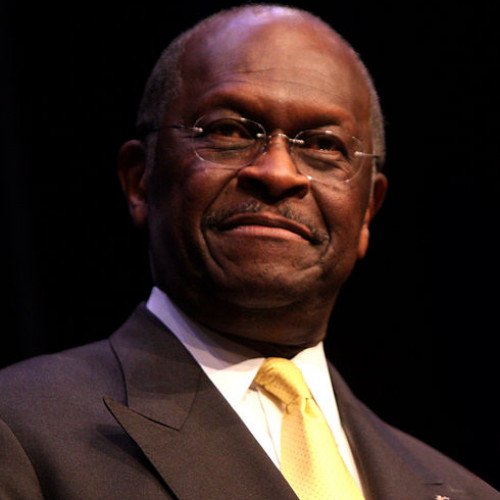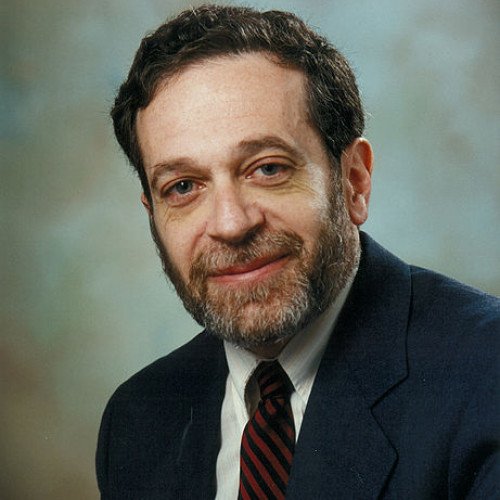Herman Cain VS Robert Reich

Herman Cain
Herman Cain (December 13, 1945 – July 30, 2020) was an American businessman and activist for the Tea Party movement within the Republican Party. Born in Memphis, Tennessee, Cain grew up in Georgia and graduated from Morehouse College with a bachelor's degree in mathematics. He then earned a master's degree in computer science at Purdue University while also working full-time for the U.S. Department of the Navy. In 1977, he joined the Pillsbury Company where he later became vice president. During the 1980s, Cain's success as a business executive at Burger King prompted Pillsbury to appoint him as chairman and CEO of Godfather's Pizza, in which capacity he served from 1986 to 1996. Cain was chairman of the Federal Reserve Bank of Kansas City Omaha Branch from 1989 to 1991. He was deputy chairman, from 1992 to 1994, and then chairman until 1996, of the Federal Reserve Bank of Kansas City. In 1995, he was appointed to the Kemp Commission and, in 1996, he served as a senior economic adviser to Bob Dole's presidential campaign. From 1996 to 1999, Cain served as president and CEO of the National Restaurant Association. In May 2011, Cain announced his 2012 presidential candidacy. By the fall, his proposed 9–9–9 tax plan and debating performances had made him a serious contender for the Republican nomination. In November, however, his campaign faced allegations of sexual misconduct, which he denied. He announced the suspension of his campaign on December 3, but remained involved in politics. In the 2020 election cycle, Cain was a co-chairman of Black Voices for Trump. Cain died from COVID-19 on July 30, 2020, at the age of 74.
Statistics for this Xoptio

Robert Reich
Robert Bernard Reich (; born June 24, 1946) is an American economic advisor, professor, author, and political commentator. He served in the administrations of Presidents Gerald Ford and Jimmy Carter, as well as serving as the United States Secretary of Labor from 1993 to 1997 under Bill Clinton. He was a member of President Barack Obama's economic transition advisory board.Reich has been the Chancellor's Professor of Public Policy at the Goldman School of Public Policy at UC Berkeley since January 2006. He was formerly a professor at Harvard University's John F. Kennedy School of Government and professor of social and economic policy at the Heller School for Social Policy and Management of Brandeis University. He has also been a contributing editor of The New Republic, The American Prospect (also chairman and founding editor), Harvard Business Review, The Atlantic, The New York Times, and The Wall Street Journal. Reich is a political commentator on programs including Erin Burnett OutFront, CNN Tonight, Anderson Cooper's AC360, Hardball with Chris Matthews, This Week with George Stephanopoulos, CNBC's Kudlow & Company, and APM's Marketplace. In 2008, Time magazine named him one of the Ten Best Cabinet Members of the century, and in the same year The Wall Street Journal placed him sixth on its list of Most Influential Business Thinkers.He has published 18 books which have been translated into 22 languages, including the best-sellers The Work of Nations, Reason, Saving Capitalism, Supercapitalism, Aftershock: The Next Economy and America's Future, and a best-selling e-book, Beyond Outrage. He is also chairman of Common Cause and writes his own blog about the political economy at Robertreich.org. The Robert Reich–Jacob Kornbluth film Saving Capitalism was selected to be a Netflix Original, and debuted in November 2017, and their film Inequality for All won a U.S. Documentary Special Jury Award for Achievement in Filmmaking at the 2013 Sundance Film Festival in Utah.In 2015 Reich and Kornbluth founded Inequality Media, a nonprofit digital media company. Inequality Media's videos feature Reich discussing topics relating to inequality and power primarily in the United States, including universal basic income, the racial wealth gap, affordable housing, and gerrymandering.